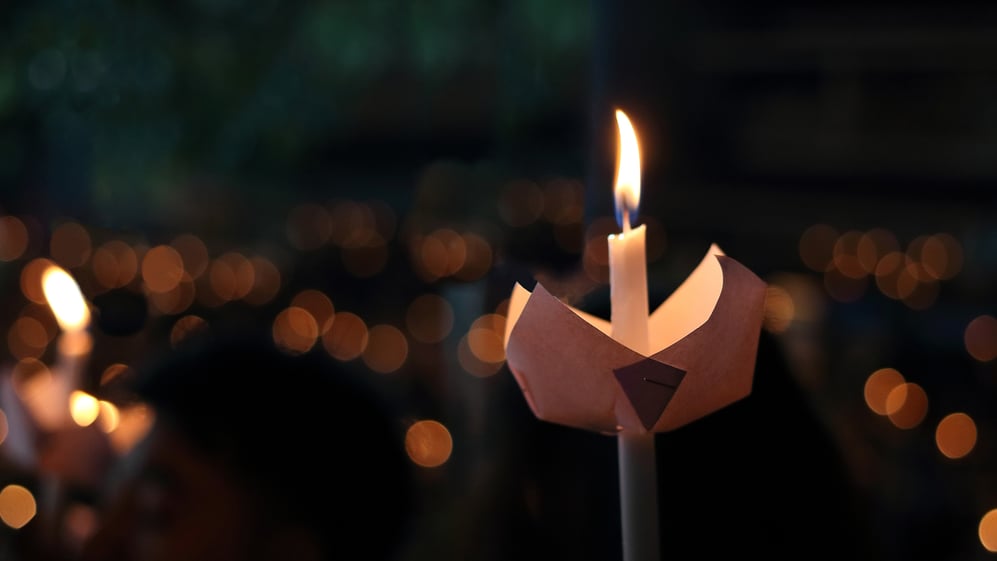During Advent and Christmas, we hear about peace. We read Isaiah’s names for the Messiah, including “Prince of Peace.” In Jesus’ birth story, recorded in Luke, the heavenly hosts say, “Glory to God in the highest, and on earth peace among those with whom He is pleased!” (Luke 2:14). We sing, “Sleep in heavenly peace” in the hymn “Silent Night, Holy Night” (LSB 363:1).
To me, the word peace brings connotations of quiet contentment and lack of conflict. I strive for peace in my life, so much so that I sometimes try to achieve it through less-than-healthy means: retreating from difficult people or conversations; immersing myself in watching TV or reading social media to soothe unpleasant feelings; and even ceasing to pray to avoid facing the hard things in my life. That kind of peace is not peace but avoidance. Peace at all costs is like a fresh coat of paint on flood-stained walls. It’s pretty on the surface but rotting underneath.
The Biblical Meaning of Peace
True peace, as described in the Bible, doesn’t come from avoidance or appeasement. True peace comes from facing the worst and turning to God.
I’m in two Bible studies right now, and I always try to pay attention when seemingly unrelated Bible passages show similar themes in the same week. What might the Holy Spirit be teaching me through studying Revelation 7 on Wednesday and Acts 3 the following Sunday?
First, Revelation 7:14–17:
And [the angel] said to me, “These are the ones coming out of the great tribulation. They have washed their robes and made them white in the blood of the Lamb.
“Therefore they are before the throne of God,
and serve Him day and night in His temple;
and He who sits on the throne will shelter them with His presence.
They shall hunger no more, neither thirst anymore;
the sun shall not strike them,
nor any scorching heat.
For the Lamb in the midst of the throne will be their shepherd,
and He will guide them to springs of living water,
and God will wipe away every tear from their eyes.”
Here we have a beautiful picture of the peace of the saints in the throne room of God, tenderly sheltered and taken care of by their Shepherd. But these saints have not avoided trouble. Their peace follows a hard-fought battle. In verse 14, they have come out of the great tribulation and washed their robes in the blood of the Lamb. In other words, they suffered during their lives, and their sins have been forgiven through Jesus’ sacrifice. Now they have peace in the constant presence of God in all His glory.
In Acts 3, we see a similar theme, though in a different time and circumstance. Peter and John heal a lame man at an entrance to the temple, and the high priests throw them in jail overnight and then demand an explanation. Peter boldly preaches the Gospel to them, declaring that the healing was accomplished in the name of the crucified and resurrected Jesus. He points out that they handed Jesus over to be killed. But Peter offers them good news. In Acts 3:17–20, Peter says:
And now, brothers, I know that you acted in ignorance, as did also your rulers. But what God foretold by the mouth of all the prophets, that His Christ would suffer, He thus fulfilled. Repent therefore, and turn back, that your sins may be blotted out, that times of refreshing may come from the presence of the Lord, and that He may send the Christ appointed for you, Jesus.
Suffering to Repentance to God’s Peace
Here, decades before John’s heavenly visions recounted in Revelation, Peter draws the same line from suffering to repentance to peace. His description of Jesus’ suffering leads to a call to repentance and the promise of “times of refreshing” in God’s presence. What Revelation describes in visual images and descriptions, Peter says directly in the Book of Acts.
Do you want peace? It starts with repentance. And repentance starts with facing our sin and turning to Jesus—the Lamb of God, the Messiah, who suffered and died to cleanse us from sin. Peace is not found in turning away from conflict or suffering but in turning toward God. It is standing firm in the love and forgiveness of God as the many battles of life on earth are fought around us and within us. We do not fight the battle because Jesus has already won it. His blood is the blood of the Lamb, which gives us forgiveness and peace.
As we sing, “Sleep in heavenly peace,” we see our little Silent Night baby resting from the tribulation of being born into our world from above. And He is resting up for the battle ahead of Him—a life lived to bring us back to God, a death that releases us from sin, and a resurrected life that promises life eternal in God’s presence. This Christmas, let us face our sinful selves, repent, turn to Jesus, and experience the true peace of God’s presence, which is offered to all who call on His name.
Scripture: ESV®.
Find peace this Advent and Christmas with a playlist filled with wonderful music from our composers.















